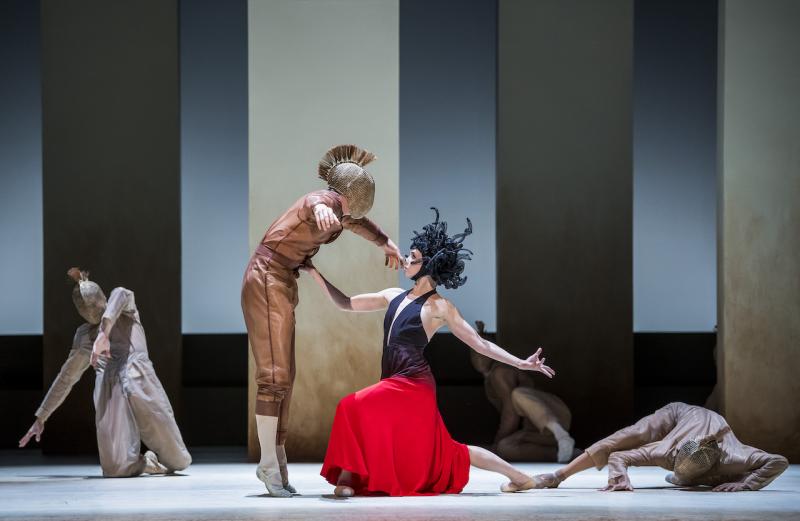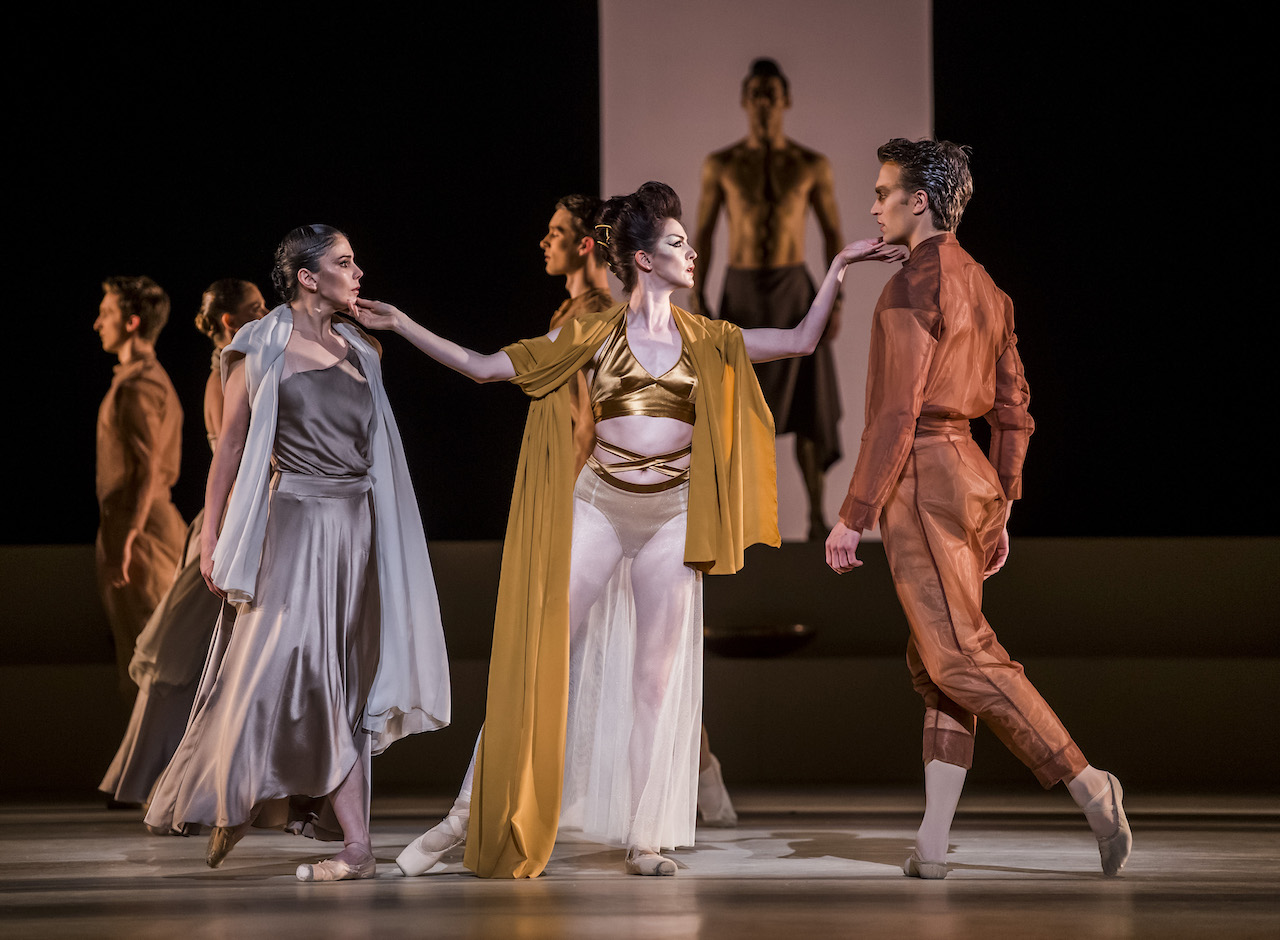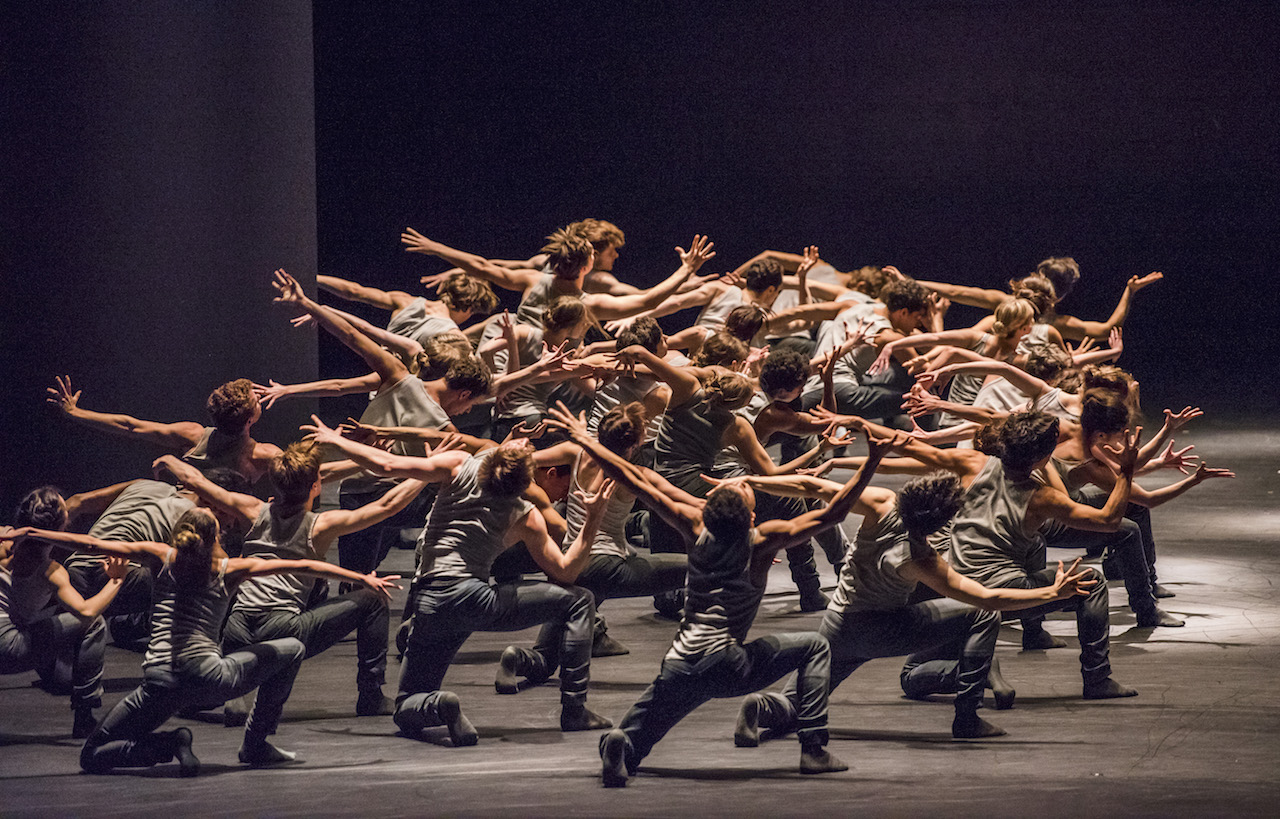Within the Golden Hour/Medusa/Flight Pattern, Royal Ballet review - the company shows its contemporary face | reviews, news & interviews
Within the Golden Hour/Medusa/Flight Pattern, Royal Ballet review - the company shows its contemporary face
Within the Golden Hour/Medusa/Flight Pattern, Royal Ballet review - the company shows its contemporary face
Osipova is astonishing as ever, but Medusa the ballet misses its mark

Sidi Larbi Cherkaoui has come a long way since his early days as a hip hop artist, but the outsider status is obvious even before the curtain goes up on Medusa, his first commission for the Royal Ballet and the centrepiece of a triple bill showcasing the company’s contemporary side.
Cherkaoui’s choice of subject – the ultimate #MeToo story of classical myth – rules out the usual ballet tropes. Far from being a love story, Medusa’s is a tale of power abuse times two. Sexual violation by a powerful male (the god Poseidon), is followed by punishment meted out by a second authority figure who ought to be outraged on Medusa’s behalf – Athena, goddess of chastity. Yet instead Athena blames the victim for the crime. Transformed into a vengeful monster with snakes for hair, the blighted Medusa thus becomes a termagant – the very antithesis of ballet's feminine ideal. Which appears to be what interests Cherkaoui.
 That, and the exciting potential of Royal Ballet principal Natalia Osipova (Pictured above), whose astonishing strength and flexibility, not to mention dramatic fabulousness, is a gift for the role. When we first meet her Medusa she’s a priestess in Athena’s temple, a cool monochrome of chaste contemplation backed by the discreet clubbing beats of Olga Wojciechowska’s electronic score. It turns out to be Cherkaoui’s bizarrest but best idea to punctuate this music throughout with songs by Henry Purcell. Sung with piercing acuity by a soprano and counter-tenor, the 17th-century soundworld draws us into an imagined distant past, racks up the tension at key points and adds a beauty that’s often lacking on stage.
That, and the exciting potential of Royal Ballet principal Natalia Osipova (Pictured above), whose astonishing strength and flexibility, not to mention dramatic fabulousness, is a gift for the role. When we first meet her Medusa she’s a priestess in Athena’s temple, a cool monochrome of chaste contemplation backed by the discreet clubbing beats of Olga Wojciechowska’s electronic score. It turns out to be Cherkaoui’s bizarrest but best idea to punctuate this music throughout with songs by Henry Purcell. Sung with piercing acuity by a soprano and counter-tenor, the 17th-century soundworld draws us into an imagined distant past, racks up the tension at key points and adds a beauty that’s often lacking on stage.
It’s as if Osipova and her phenomenal ability for coiling, kicking and turning herself inside out sucked up all Cherkaoui’s creative juices. A masked chorus of warriors looks frankly ungainly. It's unclear, too, when or even whether they're being turned to stone under Medusa's lethal gaze once she's donned the ugly black fright wig. Our familiarity with black braids and dreadlocks gave costume designer Olivia Pomp a difficult task in coming up with anything remotely shocking, and it's not.
The rape that precedes Medusa's transformation is also oddly polite, drawn out into a full-scale pas de deux with Ryoichi Hirano's poker-faced Poseidon. Medusa's mortification and shame is convincing though, as is the dismaying fact that, halfway through the assault, she appears to surrender to and even collude in Poseidon’s sick manipulations.
When in a second pas de deux Cherkaoui pairs Medusa the Gorgon with handsome Perseus (Matthew Ball), his attempt to add intrigue to the fatal encounter by hinting at a romantic history between the pair somewhat misfires. Clearly what Perseus wants to do, and must do to fulfil his destiny, is cut off the monster’s head (without a weapon, apparently: swords are a dratted encumbrance in ballet). That said, the decapitation is skilfully staged. Cherkaoui and his collaborators wisely stop short of trying to show the winged horse Pegasus leaping from Medusa’s bleeding neck, as described in the synopsis.
 Despite a searing performance from Osipova – this dancer truly is a force of nature, as a soon-to-be-released documentary will set out to show – the ballet as a whole misses its target, the story’s extremity dulled by narrative fudges. Whether any of these can be fixed before next week’s cinema relay will surely be exercising the Royal Ballet right now.
Despite a searing performance from Osipova – this dancer truly is a force of nature, as a soon-to-be-released documentary will set out to show – the ballet as a whole misses its target, the story’s extremity dulled by narrative fudges. Whether any of these can be fixed before next week’s cinema relay will surely be exercising the Royal Ballet right now.
The premiere was flanked by two revivals. Within the Golden Hour is an early-ish work made by Christopher Wheeldon for San Francisco Ballet (America’s oldest and greatest company making a rare visit to London later this month) and tonally it’s very much in the American mould – smoothly virtuosic, beautifully crafted. The Royal first performed it a couple of years ago: this time round new silvery costumes by Jasper Conran are a definite plus.
Crystal Pite’s migration epic Flight Pattern brings the triple bill to an unusually sombre close. This short but large-scale work was a hit for the Royal when it premiered two years ago and has lost none of its force. Filling the stage with 36 dark-coated dancers, the Canadian choreographer invokes the plight of refugees both past and present in surges of weighted movement that call to mind both weary foot-travel and treacherous seas. As the brooding first movement of Górecki’s Symphony of Sorrowful Songs plays out from the pit, the effect on the permanently twilit stage is of people drained of all identity by their predicament. After filing like cattle into a kind of holding pen and removing their coats, they sit cross legged, the coats piled around them like rubbish heaps. When at the close a light snow begins to fall, the Christmas card beauty feels like a sentence of slow death.
Again, on this revival, you are left convinced that here is an important work, one that shows ballet to be capable of responding to pressing issues, not merely reflecting on itself. By rejecting individual virtuosity, it uncovers important expressive potential in the mass.
rating
Explore topics
Share this article
The future of Arts Journalism
You can stop theartsdesk.com closing!
We urgently need financing to survive. Our fundraising drive has thus far raised £49,000 but we need to reach £100,000 or we will be forced to close. Please contribute here: https://gofund.me/c3f6033d
And if you can forward this information to anyone who might assist, we’d be grateful.

Subscribe to theartsdesk.com
Thank you for continuing to read our work on theartsdesk.com. For unlimited access to every article in its entirety, including our archive of more than 15,000 pieces, we're asking for £5 per month or £40 per year. We feel it's a very good deal, and hope you do too.
To take a subscription now simply click here.
And if you're looking for that extra gift for a friend or family member, why not treat them to a theartsdesk.com gift subscription?
more Dance
 'We are bowled over!' Thank you for your messages of love and support
Much-appreciated words of commendation from readers and the cultural community
'We are bowled over!' Thank you for your messages of love and support
Much-appreciated words of commendation from readers and the cultural community
 R:Evolution, English National Ballet, Sadler's Wells review - a vibrant survey of ballet in four acts
ENB set the bar high with this mixed bill, but they meet its challenges thrillingly
R:Evolution, English National Ballet, Sadler's Wells review - a vibrant survey of ballet in four acts
ENB set the bar high with this mixed bill, but they meet its challenges thrillingly
 Like Water for Chocolate, Royal Ballet review - splendid dancing and sets, but there's too much plot
Christopher Wheeldon's version looks great but is too muddling to connect with fully
Like Water for Chocolate, Royal Ballet review - splendid dancing and sets, but there's too much plot
Christopher Wheeldon's version looks great but is too muddling to connect with fully
 iD-Reloaded, Cirque Éloize, Marlowe Theatre, Canterbury review - attitude, energy and invention
A riotous blend of urban dance music, hip hop and contemporary circus
iD-Reloaded, Cirque Éloize, Marlowe Theatre, Canterbury review - attitude, energy and invention
A riotous blend of urban dance music, hip hop and contemporary circus
 How to be a Dancer in 72,000 Easy Lessons, Teaċ Daṁsa review - a riveting account of a life in dance
Michael Keegan-Dolan's unique hybrid of physical theatre and comic monologue
How to be a Dancer in 72,000 Easy Lessons, Teaċ Daṁsa review - a riveting account of a life in dance
Michael Keegan-Dolan's unique hybrid of physical theatre and comic monologue
 A Single Man, Linbury Theatre review - an anatomy of melancholy, with breaks in the clouds
Ed Watson and Jonathan Goddard are extraordinary in Jonathan Watkins' dance theatre adaptation of Isherwood's novel
A Single Man, Linbury Theatre review - an anatomy of melancholy, with breaks in the clouds
Ed Watson and Jonathan Goddard are extraordinary in Jonathan Watkins' dance theatre adaptation of Isherwood's novel
 Peaky Blinders: The Redemption of Thomas Shelby, Rambert, Sadler's Wells review - exciting dancing, if you can see it
Six TV series reduced to 100 minutes' dance time doesn't quite compute
Peaky Blinders: The Redemption of Thomas Shelby, Rambert, Sadler's Wells review - exciting dancing, if you can see it
Six TV series reduced to 100 minutes' dance time doesn't quite compute
 Giselle, National Ballet of Japan review - return of a classic, refreshed and impeccably danced
First visit by Miyako Yoshida's company leaves you wanting more
Giselle, National Ballet of Japan review - return of a classic, refreshed and impeccably danced
First visit by Miyako Yoshida's company leaves you wanting more
 Quadrophenia, Sadler's Wells review - missed opportunity to give new stage life to a Who classic
The brilliant cast need a tighter score and a stronger narrative
Quadrophenia, Sadler's Wells review - missed opportunity to give new stage life to a Who classic
The brilliant cast need a tighter score and a stronger narrative
 The Midnight Bell, Sadler's Wells review - a first reprise for one of Matthew Bourne's most compelling shows to date
The after-hours lives of the sad and lonely are drawn with compassion, originality and skill
The Midnight Bell, Sadler's Wells review - a first reprise for one of Matthew Bourne's most compelling shows to date
The after-hours lives of the sad and lonely are drawn with compassion, originality and skill
 Ballet to Broadway: Wheeldon Works, Royal Ballet review - the impressive range and reach of Christopher Wheeldon's craft
The title says it: as dancemaker, as creative magnet, the man clearly works his socks off
Ballet to Broadway: Wheeldon Works, Royal Ballet review - the impressive range and reach of Christopher Wheeldon's craft
The title says it: as dancemaker, as creative magnet, the man clearly works his socks off
 The Forsythe Programme, English National Ballet review - brains, beauty and bravura
Once again the veteran choreographer and maverick William Forsythe raises ENB's game
The Forsythe Programme, English National Ballet review - brains, beauty and bravura
Once again the veteran choreographer and maverick William Forsythe raises ENB's game

Add comment